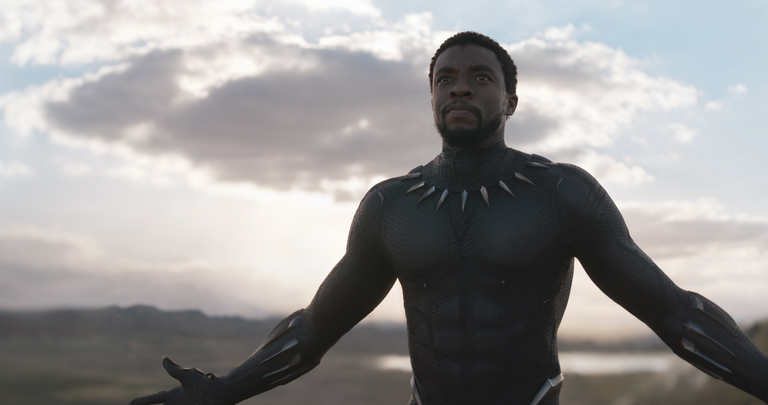Black Panther: Black Power thanks to Marvel


A year ago I told you about what happened in Hollywood about the next Oscars. There was a lot of controversy at the Academy about the decision to include a new category, that of the best popular film.
Many people have baptized it as a decision to favor in general films about superheroes and blockbusters, in particular a rule to honor and give a statuette to one of the last Marvel films: Black Panther.
The film in question is in these weeks the subject of a huge marketing campaign that sees producers trying to convince the Academy to nominate the film in the best film category even. It would be the first time for a Marvel film.
But is this Black Panther really a film worthy of such consideration?
Marvel has managed in 10 years to build an unparalleled film empire. There isn't a film that doesn't reach half a billion box office and the consistency and wisdom with which all the films in the Marvel Cinematic Universe have been set in the expanded universe in this decade is impressive.
Whether you're a seventh art purist or not, it's undeniable that the MCU operation was a resounding success and you only have to look at the Warner Bros. disaster with the DC comics universe and the various Suicide Squad, Justice League and Batman VS Superman to realize the magnitude and breadth of the operation set up by Marvel when the cinecomics world was nothing more than a rumor.
In preparation for what was the most awaited event by fans, Avengers Infinity War, Marvel had decided to focus on introducing a new superhero that we had already seen appear in the beautiful Civil War: Black Panther.
There was great expectation around the first feature film starring a black superhero, remembering that on TV this step had already been taken by Marvel itself broadcasting on Netflix Luke Cage.
The 2 hours spent in the company of T'challa in Wakanda were enough to reiterate that when Marvel produces something, it doesn't pay and never fails.
The first thing that catches the eye watching the film is that the excellent (black) director Ryan Cogler wanted to bet on a cast almost entirely made up of African-American actors with the only exception of one of the villain and the agent played by Martin Freeman. A reversal of roles unthinkable until a few years ago.
To imagine that a big production company could invest hundreds of millions for a film starring black heroes would have created embarrassment or fat laughter in Hollywood button theatres.
With the passing of the minutes you realize that with Black Panther you wanted to bet a lot on CGI and scary visual effects, with the creation of a whole new world, Wakanda, but that this graphic component was flanked by a narrative that would allow you to tell universally the harassment suffered by the African American people over time and those who still suffer today.
The result is a credible story that manages to mix action, drama and introspection.
Interesting above all is the contrast between the two heirs to the throne who, borrowed from a genuine desire to make a difference, end up clashing heavily on two opposing visions, one for the preservation of the happy oasis of the hyper-technological and prosperous Wakandan civilization and the other for a war without quarter to those who for centuries have imposed by force and violence on the African American people rules, misery and discrimination.
A narrative nucleus that gives vigor to the plot and enriches what in the end is nothing but a great entertainment film.
If we see it from this point of view then Black Panther certainly has the right to citizenship in the Oscar zone.
Having made this endorsement, however, it must be noted that to nominate such a film for the statuette of best film would be too long a step that would open the way for all the successful blockbusters who aspire to be something more, damaging all the independent and auteur cinema that in the season of the first ones has always been the undisputed leader.
The right compromise would therefore be the victory in the new category, with good peace of mind of purists and those who still want a romantic, visceral and able to surprise with images and words more than with skilled computer graphics.

Un anno fa vi avevo parlato di quanto avvenuto ad Hollywood in merito ai prossimi Oscar. Polemiche densissime hanno colpito l'Academy per la decisione di inserire una nuova categoria, quella del miglior film popolare.
In molti l'hanno battezzata come una decisione atta a favorire in generale film sui supereroi e blockbuster, in particolare una regola atta a rendere onore e regalare una statuetta ad uno degli ultimi film della Marvel: Black Panther.
Il film in questione è in queste settimane oggetto di una campagna di marketing enorme che vede i produttori provare a convincere l'Academy a candidare il film nella categoria miglior film addirittura. Sarebbe la prima volta per un film della Marvel.
Ma è davvero un film degno di tale considerazione questo Black Panther?
La Marvel è riuscita in 10 anni a costruire un impero cinematografico senza pari. Non c'è film che non raggiunga il mezzo miliardo di incassi oramai e la costanza e sapienza con cui tutti i film del Marvel Cinematic Universe sono stati incastonati nell'universo espanso in questa decade ha dell'impressionante.
Che siate puristi della settima arte o meno è innegabile che l'operazione MCU sia stata clamorosamente riuscita e basta guardare al disastro della Warner Bros con l'universo DC comics ed i vari Suicide Squad, Justice League e Batman VS Superman per rendersi conto della grandezza e della vastità dell'operazione messa in piedi dalla Marvel quando il mondo cinecomics non era che una voce di corridoio.
In preparazione a quello che era l'evento più atteso dai fan, Avengers Infinity War, la Marvel aveva deciso di puntare sull'introduzione di un nuovo supereroe che gia avevamo visto apparire nel bellissimo Civil War: Black Panther.
C'era grande attesa intorno al primo lungometraggio con protagonista un supereroe di colore, ricordando che in tv questo passo era già stato compiuto dalla Marvel stessa mandando in onda su Netflix Luke Cage.
Le 2 ore passate in compagnia di T'challa in Wakanda sono bastate per ribadire che quando la Marvel produce qualcosa non bada a spese e non fallisce mai.
La prima cosa che salta all'occhio guardando il film è che l'ottimo regista (di colore) Ryan Cogler abbia voluto puntare su un cast quasi totalmente costituito da attori afroamericani con la sola eccezione di uno dei villain e dell'agente interpretato da Martin Freeman. Un capovolgimento dei ruoli impensabile fino a qualche anno fa.
Immaginare che una grande casa di produzione potesse investire centinaia di milioni per un film con protagonisti eroi di colore avrebbe creato imbarazzo o grasse risate nelle sale dei bottoni hollywoodiane.
Con il passare dei minuti ci si rende conto che con Black Panther si sia voluto puntare tantissimo su CGI ed effetti visivi paurosi, con la creazione di un intero nuovo mondo, il Wakanda appunto, ma che a questa componente grafica si sia voluta affiancare una narrazione che permettesse di raccontare universalmente le vessazioni subite dal popolo afroamericano nel tempo e quelle che subiscono ancora oggi.
Ne emerge un racconto credibile che ben riesce a mixare azione, dramma e introspezione.
Interessante soprattutto la contrapposizione fra i 2 eredi al trono che mutuati da una genuina voglia di fare la differenza finiscono per scontrarsi pesantemente su 2 visioni opposte che li vede uno per una conservazione dell'oasi felice dell'ipertecnologica e prosperosa civiltà wakandiana e l'altro per una guerra senza quartiere a chi per secoli ha imposto con la forza e la violenza al popolo afroamericano regole, miserie e discriminazione.
Un nucleo narrativo che da vigore alla trama e arrichisce quello che in fondo non è altro che un grande film di intrattenimento.
Se la vediamo da questo punto di vista allora Black Panther ha sicuramente diritto di cittadinanza in zona Oscar.
Fatto questo endorsement bisogna però constatare che candidare un film del genere alla statuetta di miglior film sarebbe un passo troppo lungo che aprirebbe la strada a tutti i blockbuster di successo che ambiscono ad essere qualcosa in più danneggiando tutto il cinema indipendente e d'autore che nella stagione dei primi è sempre stato leader incontrastato.
Il giusto compromesso sarebbe dunque la vittoria nella nuova categoria, con buona pace dei puristi e di quelli che ancora vorrebbero un cinema romantico, viscerale e capace di sorprendere con immagini e parole più che con abili lavori di computer grafica.
